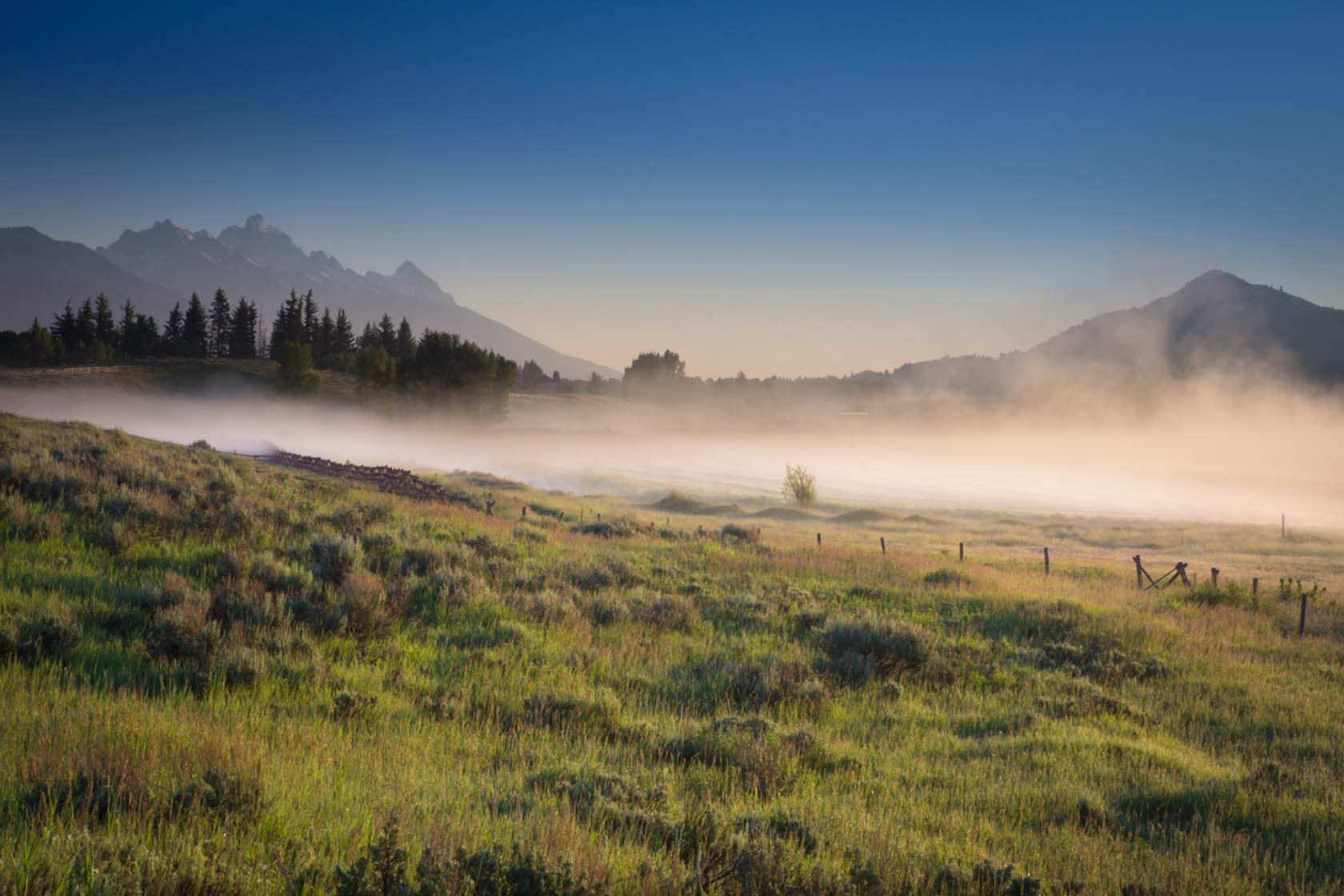
New Funding for Partnership-Powered Conservation
The Jackson Hole Land Trust (JHLT) has secured $21,250,000 in funding through the United States Department of Agriculture Natural Resources Conservation Service (NRCS)’s Regional Conservation Partnership Program (RCPP), marking a significant step forward in safeguarding critical open space in Northwest Wyoming. This five-year initiative, led by the JHLT in partnership with Grand Teton National Park (GTNP), Wind River Tribal Buffalo Initiative (WRTBI), Wyoming Game and Fish Department (WGFD), and the Wyoming Stock Growers Land Trust (WSGLT), aims to protect up to 20,000 acres of private lands, including vital wildlife corridors, cultural resources, and working farms and ranches.
“We are thrilled to secure this RCPP funding on behalf of private landowners across the region,” said JHLT President Max Ludington. “This partnership is a major step to ensure that our communities thrive while safeguarding the iconic wildlife species that call this region home. This collaboration is a testament to what can be achieved when we unite our efforts toward a common goal: creating a resilient landscape for generations to come.”
At the heart of this initiative is a commitment to ecological health, cultural preservation, and the well-being of local communities. This partnership recognizes that sustainable land management practices — rooted in a strong sense of place and community — are essential for future generations. RCPP offers a public-private funding model, where NRCS contributions are matched by partner investments to address local conservation needs while achieving landscape-scale outcomes. The JHLT and its partners will leverage the RCPP award to fund conservation easements on private land, empowering farmers, ranchers, and Tribal members to continue their stewardship of the land to support livelihoods and food systems, while safeguarding the land’s cultural and ecological values for future generations.
“Private working lands are essential to maintaining open space for our wildlife populations,” said Jill Randall, WGFD big game migration coordinator. “Partnerships like these between federal, state, Tribal, and private lands are essential to keeping Wyoming’s landscapes functioning for wildlife who understand nothing about whose land they are standing on. This RCPP award is an exciting opportunity for private landowners to be a huge part of the forward progress towards this goal.”
In addition to land protection, the project will provide financial and technical support to help landowners implement wildlife-friendly practices, reduce the impact of fencing on migrating species, and improve water and soil health. These efforts will keep working lands productive while also preserving critical wildlife corridors linking private lands with Grand Teton and Yellowstone national parks.
“We are proud to be a partner in the ongoing effort to protect open space and wildlife corridors in northwest Wyoming,” said Grand Teton National Park Superintendent Chip Jenkins. “And we are grateful to the private landowners for their initiative and the JHLT for their commitment to conservation.”
The collaboration with the WRTBI emphasizes the significance of Indigenous knowledge and cultural practices in conservation. WRTBI has been leading the restoration and rematriation of buffalo populations on Tribal lands. This approach enhances the ecological integrity of the region while honoring the cultural heritage of the Tribes and their living history with the land. By prioritizing traditional practices and upholding traditional knowledge systems as the foundation of conservation efforts, this effort fosters holistic stewardship of the landscape, ensuring its resilience for both wildlife and local communities.
“The Eastern Shoshone and Northern Arapaho Tribes have a long history of protecting land, water, and wildlife. This project prioritizes holistic land management and rematriation and will connect a diverse group of partners united by a deep commitment to ecological resilience, well-being, and shared perspectives on land management approaches.”
This project builds upon the foundation established by previous funding initiatives focused on big game conservation, further enhancing efforts to create a sustainable environment that benefits all stakeholders involved. Through this comprehensive approach, the JHLT and its partners are committed to protecting the unique landscapes of Northwest Wyoming while supporting regional communities.
“Northwest Wyoming has a strong agricultural heritage and conservation ethic,” said WSGLT Executive Director Jessica Crowder. “This partnership provides an opportunity for multiple entities to come together in support of landowners as they work to conserve agriculture, open spaces, and important wildlife habitats for future generations.”
This project showcases true collaboration, with each partner actively contributing resources and expertise to achieve shared conservation goals. The JHLT and the WSGLT will secure conservation easements that help landowners conserve their working lands and maintain agricultural operations. The WGFD will improve habitat by enhancing fencing, controlling invasive species, and managing wildlife populations. GTNP will lead ecosystem restoration efforts on key parcels. WRTBI will install wildlife-friendly infrastructure to maintain connectivity for buffalo and other migratory species. Together, these partners will create a more resilient landscape that sustains regenerative food systems and ecological integrity across Northwest Wyoming.
“The Regional Conservation Partnership Program is an example of public-private partnership at its best,” said Jackie Byam, state conservationist in Wyoming for USDA’s NRCS. “RCPP allows us to increase our conservation impact across the country, supporting our nation’s farmers, ranchers, and forest landowners while at the same time protecting our natural resources for the future. These partnerships are vital to support locally led conservation across Wyoming and ensure viability for generations to come.”